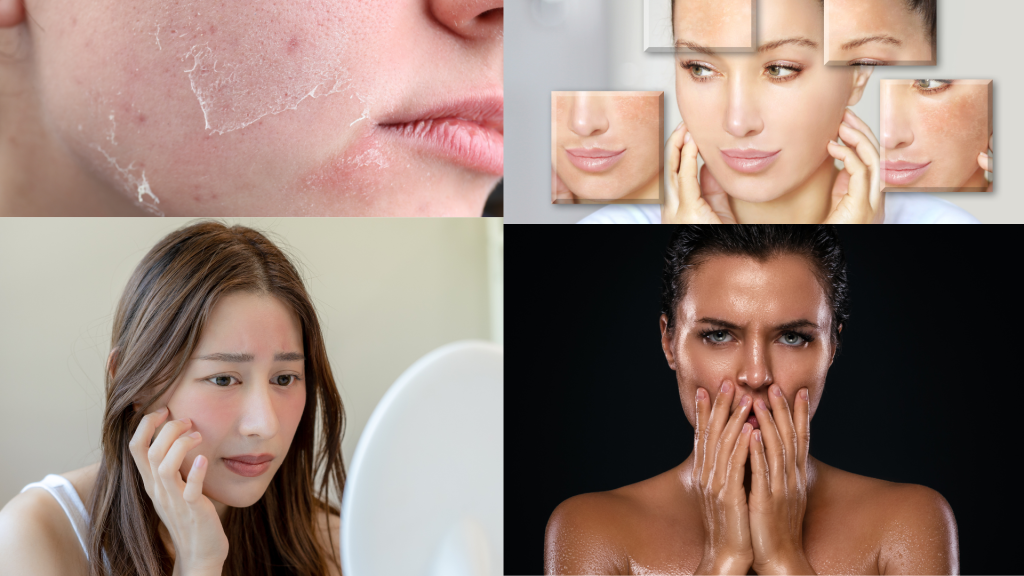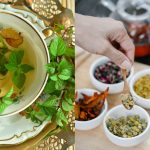OVERVIEW
A natural skincare regimen can provide a safe, chemical-free method for achieving vibrant, healthy skin. By customizing skincare routines according to individual skin types—oily, dry, sensitive, and combination—people can cater to their skin’s specific requirements and steer clear of harsh chemicals commonly found in commercial products. This article outlines a straightforward, natural skincare routine tailored for each skin type, focusing on fundamental steps such as cleansing, exfoliating, and moisturizing, while showcasing natural ingredients like aloe vera, honey, coconut oil, and green tea for optimal skin wellness.
Recognizing Distinct Skin Types and Their Requirements
- Oily Skin: This skin type is marked by the overproduction of sebum, leading to a shiny appearance and potential acne issues. The objective for oily skin is to balance oil production and minimize clogged pores without excessive drying.
- Dry Skin: This type is deficient in natural oils and may often feel tight, flaky, or rough. Hydrating and nourishing ingredients are beneficial for dry skin to help restore moisture and alleviate any irritation.
- Sensitive Skin: Easily irritated, sensitive skin often shows signs of redness or reactions to specific products. A gentle, fragrance-free regimen featuring soothing components is crucial to prevent inflammation.
- Combination Skin: Typically characterized by oily areas (the T-zone, which includes the forehead, nose, and chin) and drier cheeks, combination skin requires a balanced approach, treating each section based on its unique needs.
Natural Ingredients for Cleansing and Exfoliating
Cleansing is a vital first step in any skincare regimen to eliminate impurities, while exfoliating aids in removing dead skin cells and enhancing cell renewal. Here are mild, natural alternatives for each skin type:
- Oily Skin: Diluted apple cider vinegar functions as an effective natural toner and cleanser. Its antibacterial properties assist in reducing excess oil and bacteria that cause acne. A sugar scrub blended with honey serves as a gentle exfoliant, cleansing pores without irritation.
- Dry Skin: Coconut oil acts as an excellent natural cleanser for dry skin, hydrating while eliminating dirt. An oatmeal mixture with water or yogurt can be used as a mild exfoliant to remove dead skin while calming dryness.
- Sensitive Skin: A gentle aloe vera gel cleanser effectively cleanses sensitive skin without causing irritation. For exfoliation, ground oats mixed with water or honey offer a soft scrubbing action without causing abrasiveness.
- Combination Skin: Green tea makes for a wonderful cleanser for combination skin, as it balances oil levels and delivers antioxidants. A combination of baking soda and honey can serve as a mild exfoliant, where honey’s moisturizing properties help maintain hydration.
Moisturizing Solutions for Each Skin Type

Maintaining moisture in the skin is crucial across all skin types, though moisturizer choices may differ based on unique requirements. Here are some natural and effective selections:
- Oily Skin: Aloe vera gel serves as a fantastic lightweight moisturizer for oily skin, hydrating while avoiding clogged pores and providing anti-inflammatory benefits. Jojoba oil, which resembles the skin’s natural sebum, can also aid in controlling oil production.
- Dry Skin: Shea butter or almond oil provides profound hydration for dry skin. Both of these ingredients are rich in essential fatty acids that help restore moisture and create a barrier to retain hydration. Combining shea butter with a few drops of olive oil can yield an ultra-nourishing moisturizer.
- Sensitive Skin: Rosehip oil is gentle and exceptionally soothing, rich in antioxidants and essential fatty acids that support the repair of the skin barrier. Another viable option is chamomile-infused oil, known for its calming effects that help reduce redness.
- Combination Skin: A mixture of jojoba oil for the T-zone and rosehip oil for the drier areas works well to balance combination skin. Jojoba oil helps manage oil levels in the oily regions, while rosehip oil provides hydration for the drier areas without feeling heavy.
Simple Recipes for Masks, Toners, and Spot Treatments
Incorporating a mask, toner, or spot treatment weekly can enhance the management of common skin concerns. Below are some natural, DIY options tailored for each skin type:
- Oily Skin:
- Clay Mask: Combine bentonite clay with water to form a mask that eliminates impurities and absorbs surplus oil. Use it weekly for 10 minutes.
- Tea Tree Spot Treatment: Mix a few drops of tea tree oil with water and apply it to blemish spots. Tea tree oil is known for its antibacterial properties that assist in clearing acne.
- Dry Skin:
- Avocado Mask: Mash half an avocado with a teaspoon of honey to create an intensely moisturizing mask. Leave it on for 15 minutes, then wash it off with lukewarm water.
- Cucumber Toner: Blend cucumber and strain the juice to make a refreshing and hydrating toner that soothes dry skin.
- Sensitive Skin:
- Oat and Yogurt Mask: Combine a tablespoon of ground oats with plain yogurt to create a mild mask. Leave it on for 10 minutes to help with inflammation and redness.
- Chamomile Toner: Brew chamomile tea and allow it to cool, then use it as a toner to soothe sensitive skin.
- Combination Skin:
- Green Tea and Honey Mask: Brew green tea and mix a tablespoon with honey to create a mask that balances hydration in dry areas while controlling oiliness.
- Apple Cider Vinegar Toner: Blend equal parts of apple cider vinegar and water for a toner that helps balance pH and decrease oiliness in the T-zone.
Conclusion
Establishing a natural skincare regimen based on specific skin types can promote healthier and more radiant skin without the need for harsh chemicals. By utilizing simple, natural ingredients like aloe vera, honey, coconut oil, and green tea, individuals can effectively cleanse, exfoliate, and hydrate their skin while addressing particular concerns. These natural remedies provide a gentle skincare approach, reducing the likelihood of irritation and maintaining the skin’s natural balance. Regardless of whether someone has oily, dry, sensitive, or combination skin, these routines offer efficient and budget-friendly ways to support skin health naturally.

























